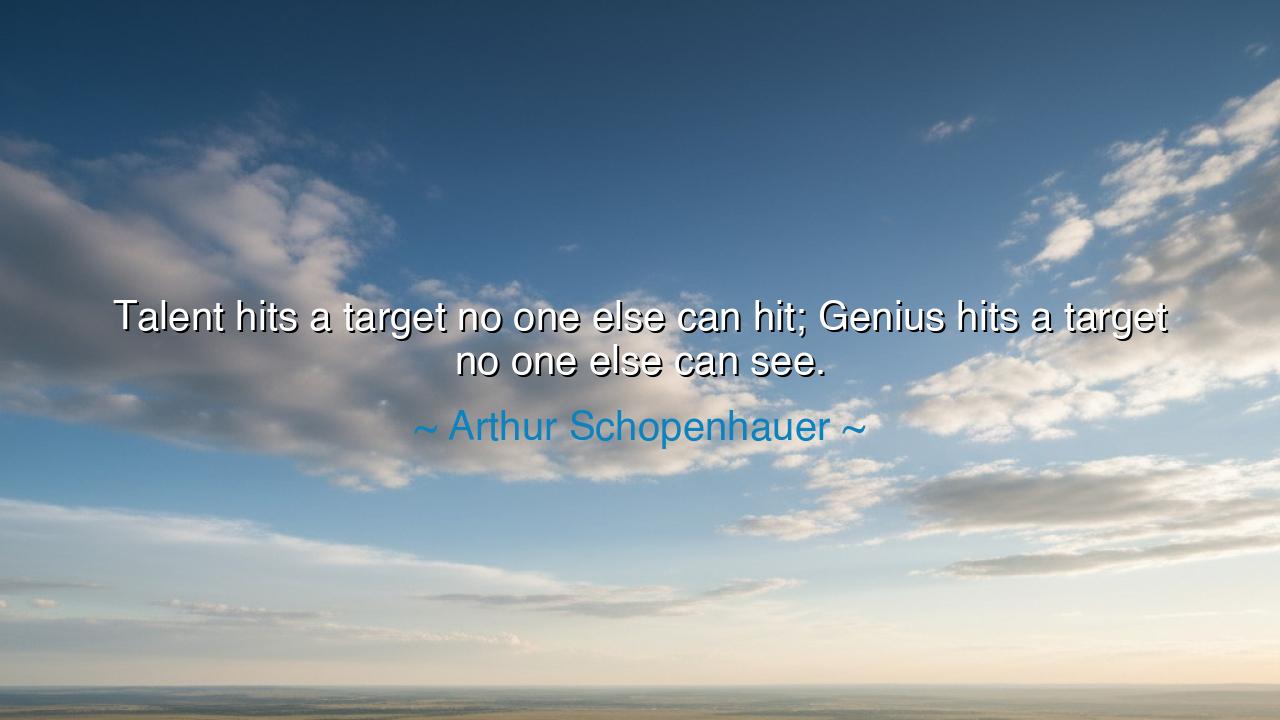
Talent hits a target no one else can hit; Genius hits a target no






“Talent hits a target no one else can hit; Genius hits a target no one else can see.” — so spoke Arthur Schopenhauer, the philosopher of the solitary mind, whose thoughts cut through illusion like a sword through mist. In this saying, he divides the world of human ability into two realms: that of the talented, who excel within the known, and that of the genius, who reaches beyond it. Talent perfects what already exists; genius creates what has never been imagined. The first masters the visible; the second unveils the invisible. And thus, Schopenhauer gives voice to an eternal truth — that true greatness lies not in skill alone, but in the courage to see what others cannot.
The origin of these words springs from Schopenhauer’s lifelong meditation on art, intellect, and the limits of human perception. Living in the shadow of Enlightenment reason, he believed that most men see the world only as appearance — a surface of forms and facts. The talented man navigates this surface with brilliance, like an archer whose eye never wavers. But the genius, he said, pierces through the veil of illusion and glimpses the world as it is in its hidden essence. His arrow is not guided by what others see, but by a vision born in the depths of the soul. That is why the genius is often misunderstood, even ridiculed, in his own time. His target is invisible to all but himself — and the world recognizes it only when he has already vanished.
Consider the story of Galileo Galilei, who lifted his telescope to the night sky and beheld moons circling Jupiter. Others saw stars; he saw a universe transformed. His discovery was not born of talent alone, for many men of talent gazed at the heavens before him — yet none saw what he saw. The genius perceives what lies beyond the ordinary reach of reason. He intuits patterns unseen, truths unspoken, beauty not yet born. And for this, he is often condemned by those who dwell within the safe walls of convention. Galileo’s vision shattered the very structure of the cosmos as men understood it. He hit a target no one else could see, and in doing so, redefined the boundaries of the possible.
But Schopenhauer’s insight extends beyond science or art; it is the story of every soul who dares to dream differently. The talented man follows paths already carved; the genius forges his own through wilderness. The one perfects tradition; the other creates it. Beethoven, who composed music that defied the limits of harmony; Van Gogh, who painted emotions rather than forms; Einstein, who imagined time itself as fluid — all walked where no footsteps had been. They were not merely skilled, but possessed by vision. And their genius was not a matter of intellect alone, but of courage — the courage to believe in what they saw, even when the world called them mad.
There is, however, a price for seeing the unseen. The genius lives between worlds — too deep for the common crowd, too visionary for his own age. He is often lonely, for his eyes are fixed on horizons others cannot recognize. The history of humanity is filled with such figures: dreamers, prophets, inventors, whose light was called madness until time itself vindicated them. Schopenhauer, who himself lived largely uncelebrated, understood this sorrow. He knew that to strike an invisible target is to risk being seen as delusional by those who cannot yet see the mark. Yet he also knew that such souls are the architects of humanity’s ascent.
The lesson, then, is not merely to admire genius, but to awaken a measure of it within ourselves. Every human being possesses the seed of that divine vision — the ability to look beyond habit, beyond fear, beyond the immediate. To be truly alive is to see more than others see: to sense possibilities where others see limits, to imagine beauty where others see chaos. The talent in you sharpens skill; the genius in you dares to dream. Both are needed, but only the second transforms the world.
So, my listener, if you would walk the path of vision, learn to look where no one looks. Cultivate your craft, yes, but also your imagination, your intuition, your willingness to stand alone in your vision. The eyes of the crowd see the visible; the eyes of genius see the eternal. When you are mocked for your dreams, remember: every great truth began as heresy, every new world began as a vision unseen.
For in the end, talent wins applause, but genius wins eternity. The talented man refines the known, but the genius creates the unknown — and it is from the unknown that the future is born. Therefore, let your arrow aim not only at what others can see, but at what your heart alone perceives. For it is there, beyond the visible horizon, that destiny waits for those brave enough to strike.






AAdministratorAdministrator
Welcome, honored guests. Please leave a comment, we will respond soon